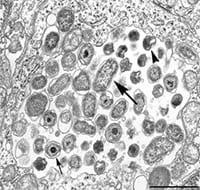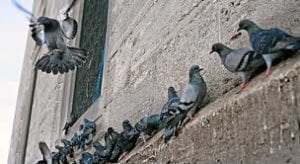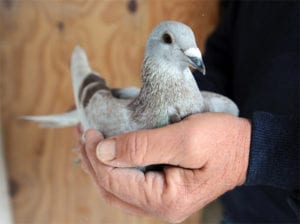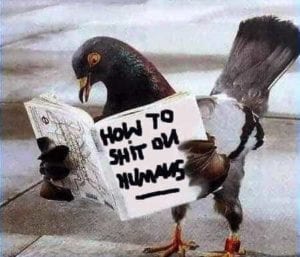
by Pigeon Patrol | Feb 16, 2020 | Bird Netting, Bird Spike, Pigeon Control, Pigeon Droppings, Pigeon Patrol's Services, Pigeon Spikes
Pigeons Carries harmful bacteria. Sampling of pigeons captured on the streets of Madrid has revealed the bacterial pathogens they carry. Researchers writing in BioMed Central’s open access journal Acta Veterinaria Scandinavica found two bugs that were highly prevalent in the bird population, Chlamydophila psittaci and Campylobacter jejuni, both of which cause illness in humans.
Fernando Esperón from the Animal Health Research Center, Madrid, Spain, worked with a team of researchers to analyse blood and enema samples taken from 118 pigeons caught using gun-propelled nets.
He said, “The present study demonstrates the extremely high prevalence of two zoonotic pathogens in feral pigeons in Madrid. At the same time, infection with these pathogens did not appear to be associated with any harmful clinical signs in the birds themselves. This leads to the hypothesis that pigeons act as asymptomatic reservoirs of  and Campylobacter jejuni which are harmful bacteria. These birds may therefore pose a public health risk to the human population.”
and Campylobacter jejuni which are harmful bacteria. These birds may therefore pose a public health risk to the human population.”
Chlamydophila psittaci was found in 52.6% of the pigeons captured, while Campylobacter jejuni was present in 69.1%. Although there have been few reports of disease transmission between pigeons and humans, it can occur by aerosols, direct contact or indirect contact through food and water contamination.
According to Esperón, “Thermophilic Campylobacter species are considered the primary pathogens responsible for acute diarrhea in the world. In fact, in many countries such as England and Wales, Canada, Australia and New Zealand Campylobacter jejuni infection causes more cases of acute diarrhea than infection by Salmonella species.”
Source
At Pigeon Patrol, we manufacture and offer a variety of bird deterrents, ranging from Ultra-flex Bird Spikes with UV protection, Bird Netting, 4-S Gel and the best Ultrasonic and audible sound devices on the market today.
Contact us at 1- 877– 4– NO-BIRD, (604) 585-9279 or visit our website at www.pigeonpatrol.ca
Bird Gone, Pigeon Gone, Seagull Gone, Pigeon issue, pigeon spikes, 1-877-4NO-BIRD, 4-S Gel, Bird Control, Pigeon Control, bird repellent, Bird Spikes, sonic bird repellent, stainless steel bird spikes, bird spikes Vancouver, Ultra Sonic Bird Control, Bird Netting, Plastic Bird Spikes, Canada bird spike deterrents, Pigeon Pests, B Gone Pigeon, Pigeon Patrol, pest controller, pest control operator, pest control technician, Pigeon Control Products, humane pigeon spikes, pigeon deterrents, pigeon traps, Pigeon repellents, Sound & Laser Deterrents, wildlife control, raccoon, skunk, squirrel deterrent, De-Fence Spikes, Dragons Den, Canada bird spikes, Canada pigeon, pigeon control, pigeon patrol, pigeon. Kill pigeons, crow, starling

by Pigeon Patrol | Feb 5, 2020 | 4-S Gel Bird repellent, Animal Deterrent Products, Bird Deterrent Products, Bird Netting, Bird Spikes, Pigeon Patrol's Services, Pigeon Spikes, Pigeons in the News, UltraSonic Bird Control
Newcastle Disease
What is Newcastle disease and what causes it? Newcastle disease is a contagious viral disease of birds and considered one of the most important poultry diseases worldwide. The disease can vary from mild to severe. A highly contagious and severe form of the disease, called exotic Newcastle disease (END), is so deadly that many birds die suddenly without showing any signs of disease. What animals get Newcastle disease? Both domestic and wild birds can be affected by Newcastle disease. Chickens are very susceptible to the disease. Turkeys, ducks, geese, as well as parrots, pigeons and wild cormorants can also get END. How can my animal get Newcastle disease? Newcastle disease is spread by direct contact with the droppings or respiratory discharges of infected birds. The virus can live for a long time in the environment and can be spread by objects (fomites), such as shoes, clothing, and equipment, that have become contaminated by infected birds. Outbreaks have occurred from the illegal imports of exotic birds. How does Newcastle disease affect my animal? Newcastle disease in birds can vary from no signs of illness to sudden death. Affected birds may have coughing, sneezing, nasal discharge, depression, and diarrhea. Chicken flocks may have a sudden decrease in egg production or produce thin shelled eggs. Signs of severe illness include swelling of the tissues of the head, muscle tremors, drooping wings, twisted head, circling, paralysis or sudden death. Can I get Newcastle disease? Yes. Infection is rare and usually very mild. People in direct contact with infected poultry or other birds can get conjunctivitis (swelling and reddening of the tissues around the eyes. Poultry crews and laboratory workers would be at the greatest risk for potential exposure to the virus during their work. No human cases of Newcastle disease have occurred from eating poultry products. Who should I contact, if I suspect Newcastle disease? In Animals – Contact your veterinarian immediately. Exotic Newcastle disease is not currently found in the U.S.; suspicion of the disease requires immediate attention. In Humans – Contact your physician. Tell him or her you have been in contact with birds with Newcastle disease. How can I protect my animals from Newcastle disease? Prevent your birds from becoming exposed to infected birds. Biosecurity measures, such as cleaning and disinfection of bird-housing facilities and equipment is very important. New introductions or birds returning to the farm should be isolated for several weeks before being placed into the flock. A vaccine is available for birds and is routinely used in poultry flocks. While this can reduce the severity of the disease, it does not completely prevent infection. How can I protect myself from Newcastle disease? When working with birds or poultry, especially when they are ill, wear protective clothing such as gloves, and safety glasses. Wash your hands after contact with birds or poultry. Avoid touching your eyes until your hands have been washed. People working with the virus in laboratories or on vaccination crews should take extra precautions. 
Source
At Pigeon Patrol, we manufacture and offer a variety of bird deterrents, ranging from Ultra-flex Bird Spikes with UV protection, Bird Netting, 4-S Gel and the best Ultrasonic and audible sound devices on the market today.
Contact us at 1- 877– 4– NO-BIRD, (604) 585-9279 or visit our website at www.pigeonpatrol.ca
Bird Gone, Pigeon Gone, Seagull Gone, Pigeon issue, pigeon spikes, 1-877-4NO-BIRD, 4-S Gel, Bird Control, Pigeon Control, bird repellent, Bird Spikes, sonic bird repellent, stainless steel bird spikes, bird spikes Vancouver, Ultra Sonic Bird Control, Bird Netting, Plastic Bird Spikes, Canada bird spike deterrents, Pigeon Pests, B Gone Pigeon, Pigeon Patrol, pest controller, pest control operator, pest control technician, Pigeon Control Products, humane pigeon spikes, pigeon deterrents, pigeon traps, Pigeon repellents, Sound & Laser Deterrents, wildlife control, raccoon, skunk, squirrel deterrent, De-Fence Spikes, Dragons Den, Canada bird spikes, Canada pigeon, pigeon control, pigeon patrol, pigeon. Kill pigeons, crow, starling

by Pigeon Patrol | Feb 5, 2020 | 4-S Gel Bird repellent, Animal Deterrent Products, Bird Deterrent Products, Bird Netting, Bird Spikes, Pigeon Droppings, Pigeon Patrol's Services, Pigeon Spikes, Pigeons in the News, UltraSonic Bird Control
With a warm spell of weather predicted, staff from Pigeon Patrol Pest Control are gearing up for more calls to deal with the bird they call the ‘flying rat’. 
Pigeons take advantage of the warmer weather to sit on outside ledges and pipework while their fouling fall to the floor below, creating a dangerously slippery surface.
Pigeon Patrol: “With pigeons now breeding four or five times a year, compared to two or three times 20 years ago, their numbers are increasing dramatically. The problem is exacerbated by people feeding them and attracting them into town squares where they are fouling on pavements and buildings.
“Pigeons are the most unhygienic and messy birds and actually carry more diseases than rats. They nest on their poo and attract mites. Nearly all pigeons carry the bird mite – a tiny insect that feeds off the bird, but will also makes humans itch and scratch. Pigeon fouling and nest materials also provide a home for many other insects such as clothes moths, carpet beetle and meal worm beetles.
Most of the pest controllers’ work against pigeons tends to be proofing of buildings and light wells, using a variety of techniques including installing nets, sprung wire systems and bird spike repellents.
Pigeon Patrol explained: “If a slipped tile goes unnoticed on a roof, or the louvers slip on a church bell tower, a pair of pigeons can get in and, in a matter of months, there can be hundreds of pigeons living in the loft space. The floor will soon be covered with fouling up to a foot deep.res further ‘natural-style’ habitats for these descendants of the Rock Dove – ll then have health and safety implications for engineers who come to service the equipment.
“Pigeon poo, when it is wet, is not too much of a danger apart from being slippery and the acidity will, of course, burn car paintwork. But when it is dry, as it often is in a loft space, or below sheltered machinery, then the airborne bacteria can become a real problem – affecting anybody that may be susceptible to asthma and other breathing difficulties.”
When pest controllers are called in, wearing special safety gear, they have to remove the birds, the nests and all loose fouling. The places they have to get to are often difficult to access, very restricted, very hot loft spaces that are about four-feet high – which is one of the reasons they dislike pigeons so much.
Pigeon Patrol Products and Services offers a specialist bird control service for facilities and property management companies in London, Sussex. Surrey and Kent, from the initial survey and specification through to the final proofing solution. As registered waste carriers, Pigeon Patrol can carry out full scale removal of bird fouling, as well as contaminated goods and furniture, from infested properties. As well as the feral pigeon, seagulls are becoming a greater problem for property owners and Pigeon Patrol can also offer advice and solutions for these pests as well.
Some facts about pigeons:
• A pigeon aged between 1 and 30 days is called a squab
• A pigeon’s white feathers have no color pigment
• Pigeons can see in color, but can also see ultra-violet light – a part of the light spectrum that humans cannot see
• Most birds take a sip of water and throw their heads back so it trickles down their throat – pigeons suck up water like straws
• In the 16th century, pigeon poo was a highly valued commodity as it was a source of salt petre or Potassium nitrate – a main ingredient of gunpowder! In France, it was also used to fertilise vineyards
• In India, the pigeon post mail service stopped in 2004
• Cher Ami and GI Joe were two famous war hero pigeons…both saved the lives of many soldiers by carrying important messages across enemy lines
• Young pigeons remain in their nests for up to two months…which is why it is only pest controllers who often get to see them!
• Peregrine Falcons are a natural predator of the pigeon…they can dive at up to 200 miles per hour. A pigeon can dive at about 70 miles an hour.
For more info
At Pigeon Patrol, we manufacture and offer a variety of bird deterrents, ranging from Ultra-flex Bird Spikes with UV protection, Bird Netting, 4-S Gel and the best Ultrasonic and audible sound devices on the market today.
Contact us at 1- 877– 4– NO-BIRD, (604) 585-9279 or visit our website at www.pigeonpatrol.ca
Bird Gone, Pigeon Gone, Seagull Gone, Pigeon issue, pigeon spikes, 1-877-4NO-BIRD, 4-S Gel, Bird Control, Pigeon Control, bird repellent, Bird Spikes, sonic bird repellent, stainless steel bird spikes, bird spikes Vancouver, Ultra Sonic Bird Control, Bird Netting, Plastic Bird Spikes, Canada bird spike deterrents, Pigeon Pests, B Gone Pigeon, Pigeon Patrol, pest controller, pest control operator, pest control technician, Pigeon Control Products, humane pigeon spikes, pigeon deterrents, pigeon traps, Pigeon repellents, Sound & Laser Deterrents, wildlife control, raccoon, skunk, squirrel deterrent, De-Fence Spikes, Dragons Den, Canada bird spikes, Canada pigeon, pigeon control, pigeon patrol, pigeon. Kill pigeons, crow, starling

by Pigeon Patrol | Feb 5, 2020 | Bird Netting, Bird Spikes, Pigeon Control, Pigeon Patrol's Services, Pigeons in the News, UltraSonic Bird Control
Pet Bird Transmitted Diseases. It may be hard to believe, but your pet bird can make you sick. There are several diseases that birds can transmit to people (these are called zoonotic diseases). For your own health, it is important to understand how to prevent transmission of these diseases.
Simple hygiene can prevent most of the diseases that birds and humans share. If you are conscientious about cleaning up after your bird and always wash your hands after handling your bird or his bowl and toys, it’s very unlikely that you will become ill. Of course, not every bird harbors such infections, but it’s always best to be safe.
Who’s at Risk

Pigeon in New York City (file / credit: STAN HONDA/AFP/Getty Images)
The risk of getting a disease from your bird is typically highest in people who already have chronic diseases, such as the very young, the elderly, HIV-infected individuals, organ-transplant recipients, and people receiving chemotherapy. People at risk should speak with both their physician and their veterinarian about the relative risks of disease transmitted from pet birds.
The following conditions are some of the more common infections carried by birds:
- Chlamydiosis – Also known as Psittacosis, can be transmitted to humans. In people, the disease causes flu-like symptoms of fever, chills and headache. If left untreated, Psittacosis can cause liver and kidney damage or even meningitis. Note: This Chlamydia is not the same infectious agent that spreads among humans as a sexually transmitted disease.
- Chlamydia infection transmits through feces and infectious particles in the air. Treatment for the infection includes an antibiotic, doxycycline, which doctors and veterinarians use in humans and birds. If you find yourself or other family members coming down with “the flu” and your bird isn’t feeling well, it could be Chlamydia; contact your family doctor and your veterinarian.
In your bird: Psittacosis causes varying severity of illness in birds. Some birds are simply carriers; this is typical in the cockatiel. Other birds may lose their appetite and become emaciated, depressed and may develop difficulty in breathing or diarrhea. Without treatment, most birds die from this disease. Diagnosis requires a panel of tests because no single test can accurately determine whether your bird is infected. You should obtain these tests as part of a pre-purchase examination, especially if there are clinical signs of Psittacosis.
- Avian Tuberculosis – Not often seen in birds, but transmission to people can lead to respiratory infections, swelling of lymph nodes below the jaw and even widespread disease in people with weakened immune systems. The disease can spread through the air or through the feces from infected birds.
In your bird:
Affected birds usually have vague symptoms, such as loss of weight despite a good appetite, dull feather coloring, increase in urine output, diarrhea and anemia. Diagnostic tests aren’t too reliable, but a veterinarian experienced with avian diseases will usually examine the feces for bacteria. Euthanasia of a bird infected with Mycobacteria is necessary due to the potential danger to humans.
- Histoplasmosis – A respiratory infection in people who inhale fungal spores from contaminated soil or dust. The Histoplasma fungus grows on bird feces, so it’s a concern in buildings where large amounts of pigeon droppings collect in roosting sites. While this isn’t a big issue in pet birds, it is prudent not to allow fecal matter to accumulate to the point that mold can grow on it.
- Cryptococcus – Another fungal infection. Though uncommon in pet birds, infection can cause diarrhea, paralysis, nervous-system signs and masses with a gelatinous consistency. Humans can contract this disease when they inhale the dust from dried droppings (most commonly from pigeons). Infection in people can be quite serious leading to meningitis, encephalitis (brain inflammation) or respiratory symptoms.
- Allergic Alveolitus – While not truly a zoonotic disease in the sense that it does not affect birds, bird owners can contract Allergic Alveolitus by inhaling particles of bird dander in the air. Allergic Alveolitus also goes by the names of Pigeon Lung Disease and Parakeet Dander Pneumoconiosis.
- Campylobacteriosis – A bacterial infection that causes gastrointestinal problems. It usually transmits through fecal contamination of food and water. While diarrhea, weight loss, and lethargy are common, Campylobacteriosis can also be present in birds that show no symptoms of illness.
Although this list is not inclusive, it does list the more common diseases that can pass to humans keeping pet birds. Good hygiene practices are the best method of prevention!
Source
At Pigeon Patrol, we manufacture and offer a variety of bird deterrents, ranging from Ultra-flex Bird Spikes with UV protection, Bird Netting, 4-S Gel and the best Ultrasonic and audible sound devices on the market today.
Contact us at 1- 877– 4– NO-BIRD, (604) 585-9279 or visit our website at www.pigeonpatrol.ca
Bird Gone, Pigeon Gone, Seagull Gone, Pigeon issue, pigeon spikes, 1-877-4NO-BIRD, 4-S Gel, Bird Control, Pigeon Control, bird repellent, Bird Spikes, sonic bird repellent, stainless steel bird spikes, bird spikes Vancouver, Ultra Sonic Bird Control, Bird Netting, Plastic Bird Spikes, Canada bird spike deterrents, Pigeon Pests, B Gone Pigeon, Pigeon Patrol, pest controller, pest control operator, pest control technician, Pigeon Control Products, humane pigeon spikes, pigeon deterrents, pigeon traps, Pigeon repellents, Sound & Laser Deterrents, wildlife control, raccoon, skunk, squirrel deterrent, De-Fence Spikes, Dragons Den, Canada bird spikes, Canada pigeon, pigeon control, pigeon patrol, pigeon. Kill pigeons, crow, starling

by Pigeon Patrol | Jan 31, 2020 | 4-S Gel Bird repellent, Animal Deterrent Products, Bird Spike, Pigeon Control, Pigeon Droppings, Pigeon Patrol's Services, Pigeon Spikes, Pigeons in the News, UltraSonic Bird Control
 Now that the weather is getting warmer, I’d like to open my windows and get some fresh air in my apartment. The windows and building are filthy grimy and covered with pigeon poop problem on the outside. The ledge and the side of the building are too. If I open the window the soot all blows into our apartment and I don’t even want to know what diseases could come from the poop. Are landlords required to wash the facade of a building? What about windows? I can still see out of them, but just barely. And if a landlord is required to do this, how can I get mine to do it? Our landlord does the bare minimum to maintain our building.
Now that the weather is getting warmer, I’d like to open my windows and get some fresh air in my apartment. The windows and building are filthy grimy and covered with pigeon poop problem on the outside. The ledge and the side of the building are too. If I open the window the soot all blows into our apartment and I don’t even want to know what diseases could come from the poop. Are landlords required to wash the facade of a building? What about windows? I can still see out of them, but just barely. And if a landlord is required to do this, how can I get mine to do it? Our landlord does the bare minimum to maintain our building.
My friend, Emma, is two and a half years old. She’s a big girl now and doesn’t need a diaper. But three or four months ago she could fill a diaper as well as any 6’5″ sailor who ate all the beans in the galley. I’m talking arm pits to knees! Where does it all come from? It’s as if small children are packed with adult-sized digestive systems. Same with pigeons; they generate a remarkable volume of poop given their size. Maybe it’s because they will eat anything, including the bodies of their fallen comrades.
Everyone who lives in a city has a pigeon story. I used to drive an MG convertible. I remember waiting at a stop light on Division Street. I happened to look up and from the steel girder above I noticed a pigeon’s ass maneuvering to drop a bomb. I couldn’t go anywhere! I ended up with what seemed to be a bucket load of shit running down the back of my shirt. Needless to say, I don’t believe any of wives’ tales about pigeon poop bringing good luck.
In fact pigeon poop is dangerous. There are several diseases associated with p-scat. Pigeons are the subjects of eradication programs throughout the world’s large cities.
In San Francisco, we have laws prohibiting the feeding of pigeons. The San Francisco Department of Public Health has a program devoted to dealing with pigeons and their excrement. If you have already complained to the landlord about the problem in writing and he has done nothing, call them.
I am not aware of any specific legal requirement for landlords to wash windows or facades of their buildings. But I’m willing to bet that there are other issues with the building and your apartment, given the lack of maintenance. Take a look around and check to see if there is peeling paint; windows that won’t open (sealed shut with shit?); cracks in the walls; leaks; other safety hazards, etc. If you believe there are violations, inform the landlord in writing. Again, if he doesn’t respond, call a Housing Inspector with the Department of Building Inspection, make a complaint and arrange for an inspection for this pigeon poop problem.
If the landlord tells you there is nothing he can do, maybe he needs a diaper.
Post From: Tenant Lawyers
At Pigeon Patrol, we manufacture and offer a variety of bird deterrents, ranging from Ultra-flex Bird Spikes with UV protection, Bird Netting, 4-S Gel and the best Ultrasonic and audible sound devices on the market today.
Contact us at 1- 877– 4– NO-BIRD, (604) 585-9279 or visit our website at www.pigeonpatrol.ca
Bird Gone, Pigeon Gone, Seagull Gone, Pigeon issue, pigeon spikes, 1-877-4NO-BIRD, 4-S Gel, Bird Control, Pigeon Control, bird repellent, Bird Spikes, sonic bird repellent, stainless steel bird spikes, bird spikes Vancouver, Ultra Sonic Bird Control, Bird Netting, Plastic Bird Spikes, Canada bird spike deterrents, Pigeon Pests, B Gone Pigeon, Pigeon Patrol, pest controller, pest control operator, pest control technician, Pigeon Control Products, humane pigeon spikes, pigeon deterrents, pigeon traps, Pigeon repellents, Sound & Laser Deterrents, wildlife control, raccoon, skunk, squirrel deterrent, De-Fence Spikes, Dragons Den, Canada bird spikes, Canada pigeon, pigeon control, pigeon patrol, pigeon. Kill pigeons, crow, starling

 and Campylobacter jejuni which are harmful bacteria. These birds may therefore pose a public health risk to the human population.”
and Campylobacter jejuni which are harmful bacteria. These birds may therefore pose a public health risk to the human population.”



